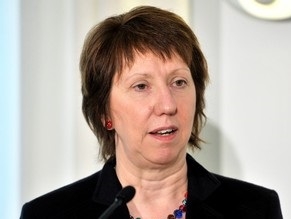|
World Jewish News

EU foreign policy chief Catherine Ashton [file] Photo: REUTERS/Kimmo Mantyla/Lehtikuva
|
Israel, EU to begin Horizon 2020 talks following Israeli statement against 'settlement guidelines'
13.08.2013, Israel and the World A senior Foreign Ministry official is expected to deliver an opening statement Wednesday distancing Israel from the EU's recently published settlement guidelines as a way for Israel to begin technical discussions with the EU on the lucrative Horizon 2020 R&D project.
The Jerusalem Post has learned that Irit Ben-Abba, the ministry's deputy director-general for economic affairs, is expected to say that while Israel does not agree that funds should not be spent beyond the Green Line, it also understands that the EU can determine what it wants to do with its funds. What Jerusalem cannot accept, she is likely to say, is EU efforts to compel Israeli companies from working beyond the Green Line.
Under the guidelines, Israeli companies will not be eligible for "financial instruments," such as loans, if it does business with companies in east Jerusalem, the Golan Heights or the West Bank. They would still be eligible, however, for grant and prize money, the vast majority of the funds coming to Israel through various EU programs.
Ben-Abba is also expected to say that the guidelines go well beyond the EU's stated goal of tying to ensure that EU funds do not go beyond the Green Line.
The new EU policy also calls for Israel to sign a "territorial clause" before entering into any new agreements with the EU which would say that the agreement is inapplicable in east Jerusalem, the Golan Heights or the West Bank. Israel is interpreting this as an attempt by the EU to get Israel to sign a waiver of claims to these areas before being able to enter agreements with the EU, something it has declared an unwillingness to do. Israel has formally annexed east Jerusalem and the Golan Heights.
The settlement guidelines, published last month, have cast a heavy pall over Israel-EU relations, with Prime Minister Binyamin Netanyahu telling visiting German Foreign Minister Guido Westerwelle on Monday that the guidelines have "actually undermined peace" by hardening Palestinian positions.
The Jerusalem Post has learned that Netanyahu spoke with EU foreign policy chief Catherine Ashton about the guidelines on Friday night in a conversation described by one diplomatic official as "difficult."
According to the official, Netanyahu told Ashton that Israel could not join the Horizon 2020 program on the basis of these guidelines. Ashton said that the EU was interested in Israel's involvement, but she made no commitments or promises about modifying the guidelines.
Ben-Abba will head the Israeli delegation that will meet tomorrow with senior officials from the EU's Directorate-General for Research and Innovation.
A source in the EU delegation in Tel Aviv said that officials will deal only with the technical and financial aspects of Horizon 2020.
One Israeli diplomatic official said that after Ben-Abba's opening statement will make clear Israel's objections to the guidelines, the Israeli team will sit down and talk about the technical issues regarding Israel's participation in the program.
However, before the two sides meet for the next round of talks in September, Israel is hoping to come to understandings with the EU that will allow Israel to participate in the program.
A team made up of legal experts from various ministries is currently working to draw up different formulas that would make it possible for Israel to live with the guidelines.
In parallel, Israel is speaking to various political leaders in the EU – such as Westerwelle – hoping to get the political leadership to lean on the EU bureaucracy so that it allows for interpretations of the guidelines that will enable Israel to take part in future projects.
This issue is expected to come up at the annual informal meeting of EU foreign ministers that will take place in Lithuania on September 6. Israel's hope is that a message will emerge from that meeting to the EU bureaucracy in Brussels that will lead to flexibility on the matter.
One Israeli official said time is short, since the negotiations with the EU over Israel's participation in Horizon 2020 need to be wrapped up by the end of November to enable Israel's participation in the program set to begin on January 1.
Horizon 2020 is the EU’s innovation flagship program meant to create jobs and fuel economic growth. Israel is the only non EU country that has been asked to join the program, and is expected to invest some 600 million euros in it over the next seven years, with an expectation of getting back 900 million euros in research funds and other inbound investments. A number of European officials have said the EU is keen on having Israeli involvement in the program because of its cutting-edge research, technological and innovative capabilities.
By HERB KEINON
JPost.com
|
|
